听力句型 课件(共26张PPT)-2026届高考英语一轮复习专项
文档属性
| 名称 | 听力句型 课件(共26张PPT)-2026届高考英语一轮复习专项 | 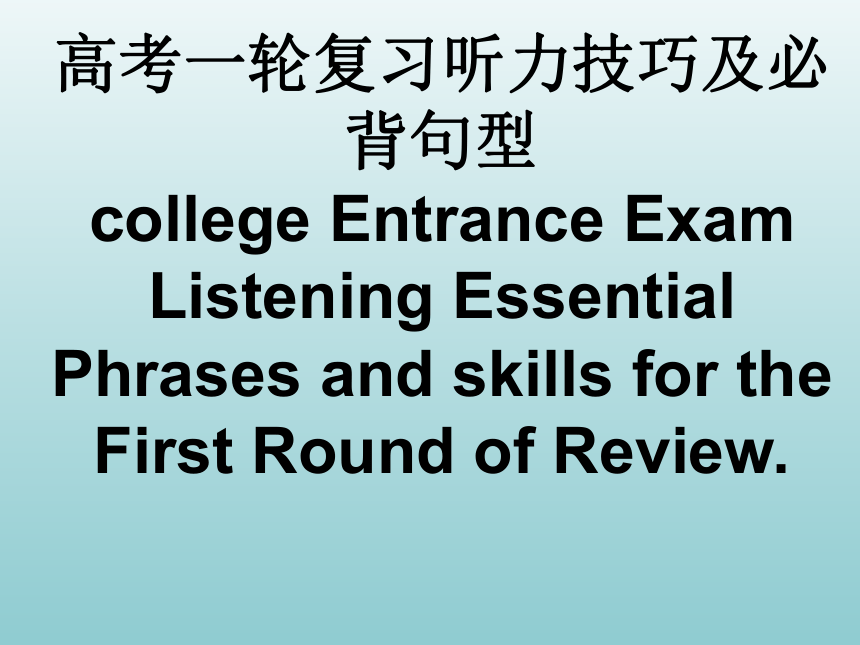 | |
| 格式 | pptx | ||
| 文件大小 | 274.8KB | ||
| 资源类型 | 教案 | ||
| 版本资源 | 通用版 | ||
| 科目 | 英语 | ||
| 更新时间 | 2025-07-17 08:09:48 | ||
图片预览

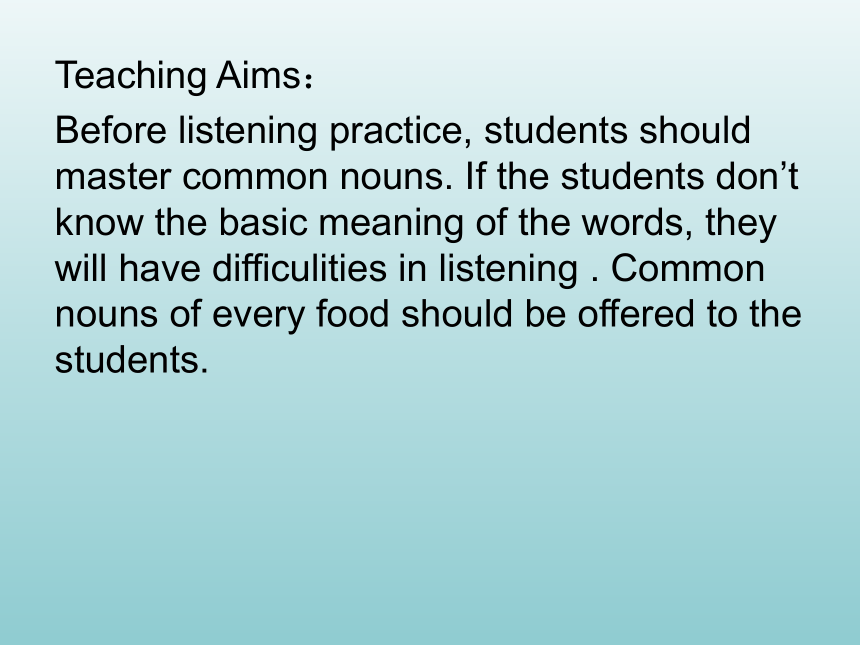

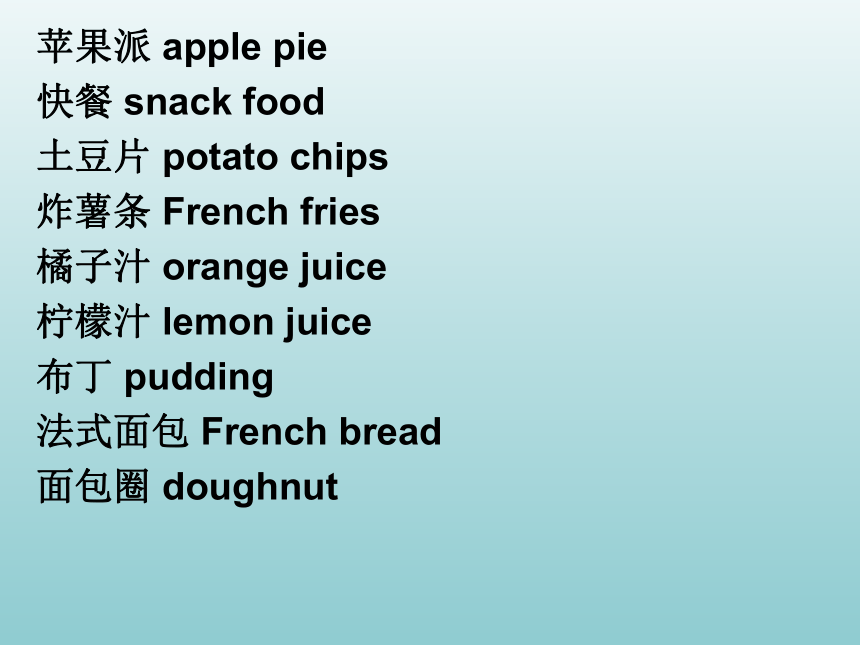
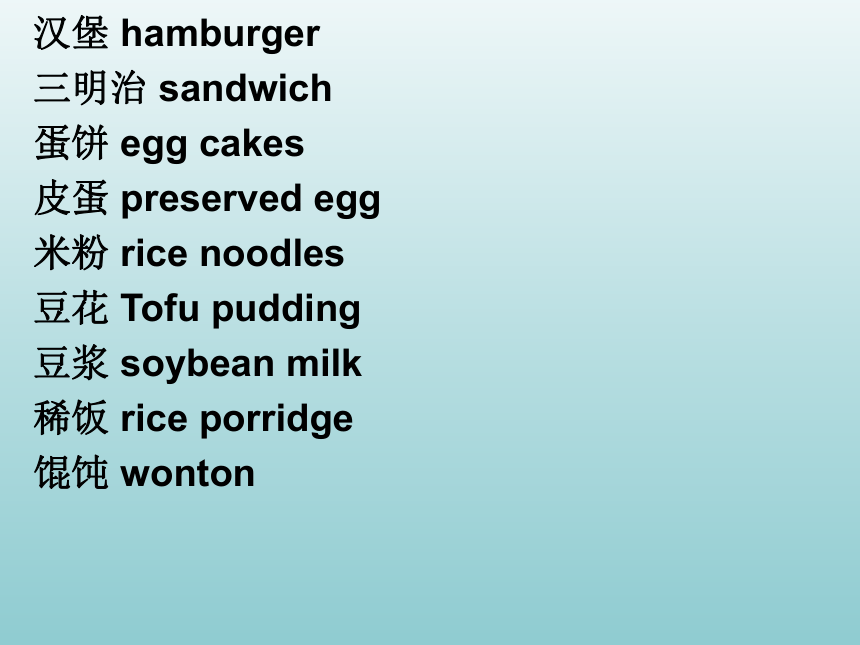
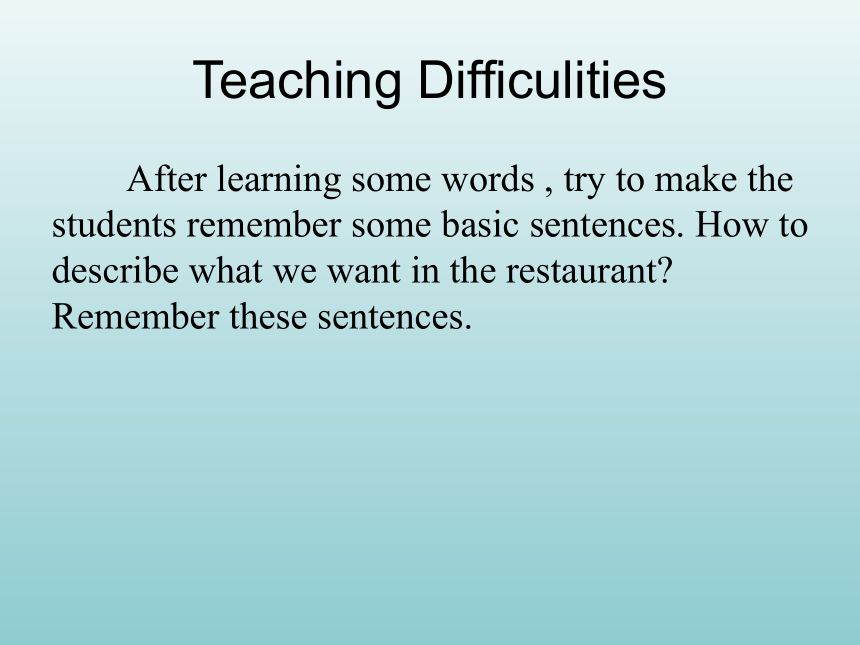
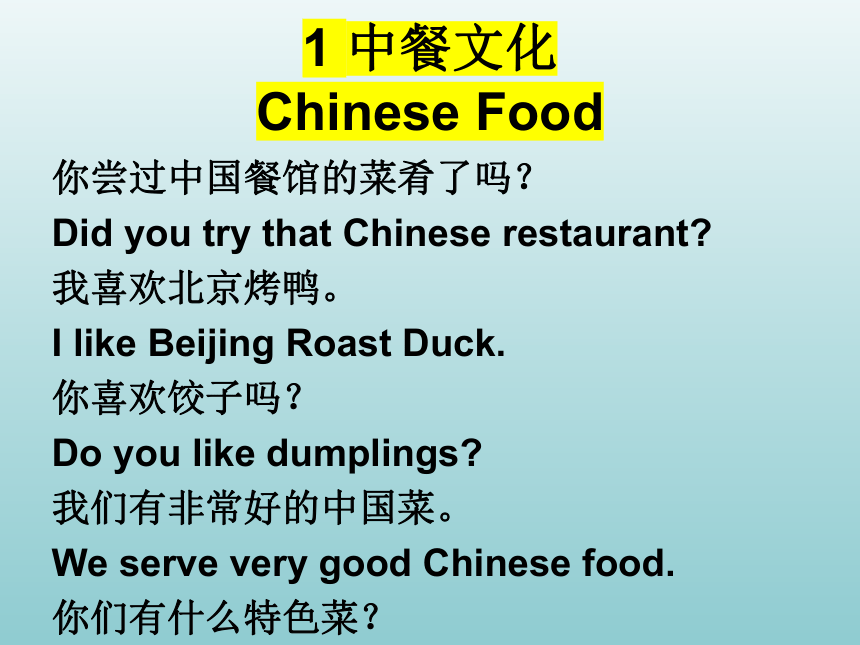
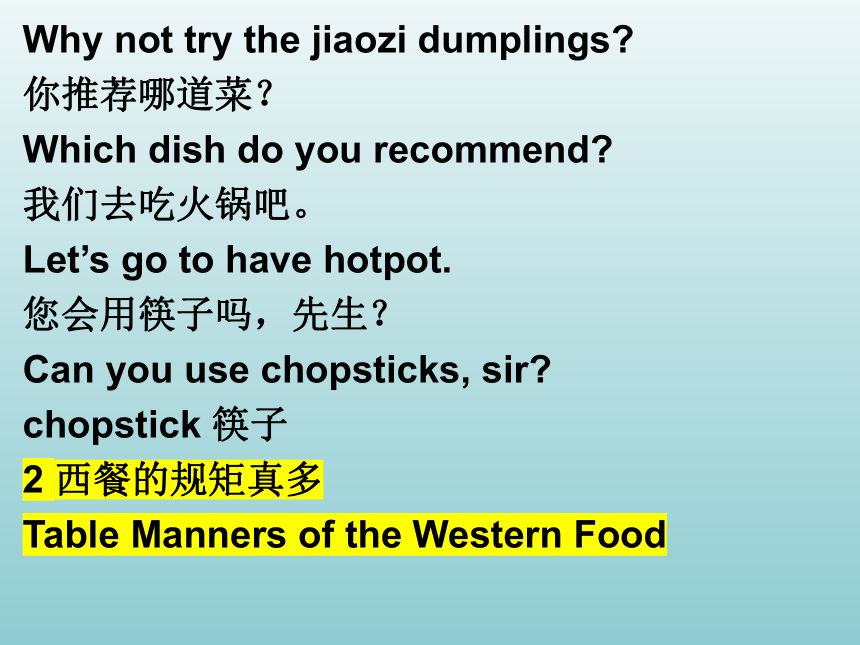
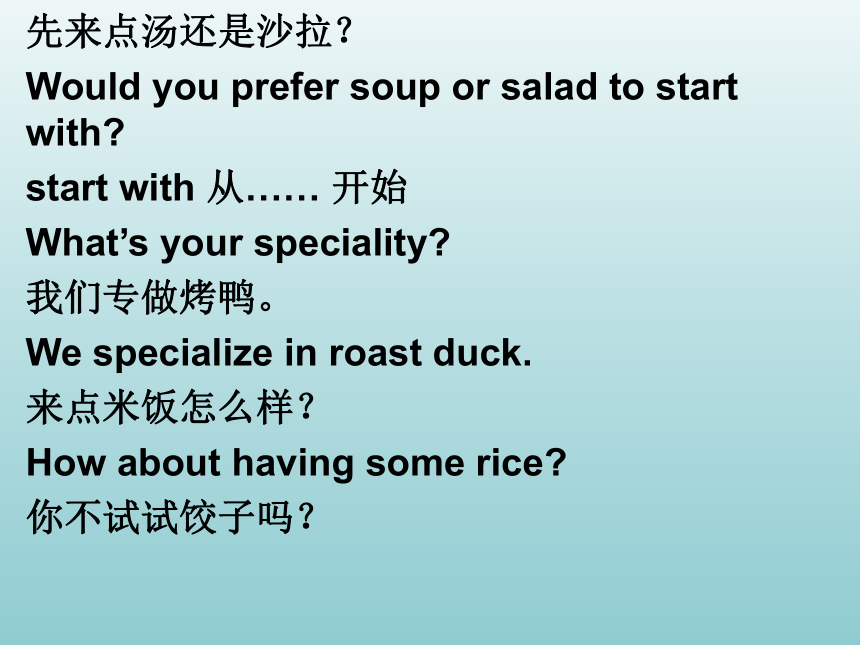
文档简介
(共26张PPT)
高考一轮复习听力技巧及必背句型
college Entrance Exam Listening Essential Phrases and skills for the First Round of Review.
Teaching Aims:
Before listening practice, students should master common nouns. If the students don’t know the basic meaning of the words, they will have difficulities in mon nouns of every food should be offered to the students.
食住行 Basic Necessities of Life
苹果派 apple pie
快餐 snack food
土豆片 potato chips
炸薯条 French fries
橘子汁 orange juice
柠檬汁 lemon juice
布丁 pudding
法式面包 French bread
面包圈 doughnut
汉堡 hamburger
三明治 sandwich
蛋饼 egg cakes
皮蛋 preserved egg
米粉 rice noodles
豆花 Tofu pudding
豆浆 soybean milk
稀饭 rice porridge
馄饨 wonton
Teaching Difficulities
After learning some words , try to make the students remember some basic sentences. How to describe what we want in the restaurant Remember these sentences.
1 中餐文化
Chinese Food
你尝过中国餐馆的菜肴了吗?
Did you try that Chinese restaurant
我喜欢北京烤鸭。
I like Beijing Roast Duck.
你喜欢饺子吗?
Do you like dumplings
我们有非常好的中国菜。
We serve very good Chinese food.
你们有什么特色菜?
Why not try the jiaozi dumplings
你推荐哪道菜?
Which dish do you recommend
我们去吃火锅吧。
Let’s go to have hotpot.
您会用筷子吗,先生?
Can you use chopsticks, sir
chopstick 筷子
2 西餐的规矩真多
Table Manners of the Western Food
先来点汤还是沙拉?
Would you prefer soup or salad to start with
start with 从…… 开始
What’s your speciality
我们专做烤鸭。
We specialize in roast duck.
来点米饭怎么样?
How about having some rice
你不试试饺子吗?
你想要哪种色拉酱?
What kind of dressing would you like
请给我土豆饼。
Hash browns, please.
主厨沙拉里有什么?
What’s in the chef’s salad
我想尝一尝奶油菜花汤。
I’ll try the cream cauliflower.
请另外给我一份薯条。
Bring me a side of French fries, please.
我们要一个大的比萨饼。
We want a large pizza.
我要一份甘蓝沙拉。
I’d like a side order of coleslaw.
coleslaw=coldslaw 凉拌卷心菜
汉堡有多大?
How big is the hamburger
请给我一大杯可乐。
A large Coke, please.
能再多给我点面包吗?
Can I have more bread
甜点要什么?
What would you like for dessert
dessert 甜点
我喜欢蔬菜牛肉汤。
I like vegetable beef soup.
3 快餐真便捷
Fast Food
我要两个汉堡。
I’d like two hamburgers.
你的炸薯条马上就好。
Your French fries will be ready in a minute.
in a minute 马上,立即
我要一个中杯可乐。
I want a medium Coke.
我要一个加番茄酱的汉堡。
I’d like a hamburger with ketchup.
ketchup 番茄酱
4 酒水饮料
Beverage
您要喝点什么?
What would you like to drink
你们这里有什么啤酒?
What beers do you have
我可以看看酒单吗?
May I see the wine list
我想要一瓶红酒。
I’d like a bottle of red wine.
I’d like some champagne.
请加水。
Please add water.
给我拿最凉的啤酒。
Bring me the coldest beer.
我要一杯低度啤酒。
I’d like a light beer.
要烈一些的。
Something stronger.
少加可乐。
Easy on the Coke.
掌握一些听力技巧
一、Pre - listening Skills(听前技巧)
Preview and Predict(预览与预测)
Quickly glance at the questions, options (if any), and related pictures or titles. Try to predict the topic, possible content, and key information of the listening material.
For example, if the questions are about a school event and there are pictures of a sports meeting, you can predict that the listening might be about the sports meeting arrangements or results.
Look at the key words in the questions, such as “When will the party be held ”, “Where is the library located ”, and predict the types of information (time, place, etc.) you need to catch.
二 Activate Background Knowledge(激活背景知识)
Connect the topic with your own knowledge. If the listening is about environmental protection, recall what you know about pollution types, conservation methods, etc. This helps you understand the content better and catch relevant information faster.
三 Learn Key Nouns and Vocabulary in Advance(提前学习关键名词和词汇)
Identify the possible key nouns related to the predicted topic. For a listening about a travel experience, learn nouns like “destination”, “landmark”, “souvenir”, “flight”, etc. Familiarize yourself with their pronunciations and meanings so that you won't get stuck when hearing them.
四、While - listening Skills(听中技巧)
Focus on Key Information(聚焦关键信息)
Pay attention to “signal words” that indicate important content. For example:
Time and sequence: “first”, “then”, “next”, “finally”, “in the morning/afternoon/evening”, “yesterday”, “tomorrow”.
Cause and effect: “because”, “so”, “therefore”, “as a result”.
Comparison and contrast: “but”, “however”, “while”, “unlike”, “on the contrary”.
Emphasis: “in fact”, “actually”, “especially”, “most importantly”.
Catch key nouns, verbs, and adjectives that carry the main meaning. For a dialogue about a restaurant order, “steak”, “pizza”, “delicious”, “order” are key words.
五 Take Notes(做笔记)
Write down brief notes using symbols, abbreviations, or key words. For example, if you hear “The meeting will start at 3 p.m. in the school hall and last for 2 hours”, you can note “3pm, sch hall, 2h”.
For numbers, names, and places, write them down as soon as you hear them as they are often key information.
六 Ignore Unfamiliar Words Temporarily(暂时忽略不熟悉的单词)
Don't get distracted by a word you don't know. Keep listening to get the overall meaning. Often, the context can help you guess the meaning of the unfamiliar word or it may not be crucial to understanding the main content.
三、Post - listening Skills(听后技巧)
Check and Confirm(检查与确认)
If there are multiple - choice questions, check if your answers are consistent with the key information you caught. Make sure you haven't misheard or misinterpreted due to pronunciation similarities (e.g., “night” and “knight”).
For open - ended questions, organize your notes and make sure your answers are complete and accurate in terms of grammar and content.
Summarize the Content(总结内容)
Try to summarize the main idea of the listening material in one or two sentences. This helps reinforce your understanding and is also useful for improving your overall listening comprehension ability over time.
高考一轮复习听力技巧及必背句型
college Entrance Exam Listening Essential Phrases and skills for the First Round of Review.
Teaching Aims:
Before listening practice, students should master common nouns. If the students don’t know the basic meaning of the words, they will have difficulities in mon nouns of every food should be offered to the students.
食住行 Basic Necessities of Life
苹果派 apple pie
快餐 snack food
土豆片 potato chips
炸薯条 French fries
橘子汁 orange juice
柠檬汁 lemon juice
布丁 pudding
法式面包 French bread
面包圈 doughnut
汉堡 hamburger
三明治 sandwich
蛋饼 egg cakes
皮蛋 preserved egg
米粉 rice noodles
豆花 Tofu pudding
豆浆 soybean milk
稀饭 rice porridge
馄饨 wonton
Teaching Difficulities
After learning some words , try to make the students remember some basic sentences. How to describe what we want in the restaurant Remember these sentences.
1 中餐文化
Chinese Food
你尝过中国餐馆的菜肴了吗?
Did you try that Chinese restaurant
我喜欢北京烤鸭。
I like Beijing Roast Duck.
你喜欢饺子吗?
Do you like dumplings
我们有非常好的中国菜。
We serve very good Chinese food.
你们有什么特色菜?
Why not try the jiaozi dumplings
你推荐哪道菜?
Which dish do you recommend
我们去吃火锅吧。
Let’s go to have hotpot.
您会用筷子吗,先生?
Can you use chopsticks, sir
chopstick 筷子
2 西餐的规矩真多
Table Manners of the Western Food
先来点汤还是沙拉?
Would you prefer soup or salad to start with
start with 从…… 开始
What’s your speciality
我们专做烤鸭。
We specialize in roast duck.
来点米饭怎么样?
How about having some rice
你不试试饺子吗?
你想要哪种色拉酱?
What kind of dressing would you like
请给我土豆饼。
Hash browns, please.
主厨沙拉里有什么?
What’s in the chef’s salad
我想尝一尝奶油菜花汤。
I’ll try the cream cauliflower.
请另外给我一份薯条。
Bring me a side of French fries, please.
我们要一个大的比萨饼。
We want a large pizza.
我要一份甘蓝沙拉。
I’d like a side order of coleslaw.
coleslaw=coldslaw 凉拌卷心菜
汉堡有多大?
How big is the hamburger
请给我一大杯可乐。
A large Coke, please.
能再多给我点面包吗?
Can I have more bread
甜点要什么?
What would you like for dessert
dessert 甜点
我喜欢蔬菜牛肉汤。
I like vegetable beef soup.
3 快餐真便捷
Fast Food
我要两个汉堡。
I’d like two hamburgers.
你的炸薯条马上就好。
Your French fries will be ready in a minute.
in a minute 马上,立即
我要一个中杯可乐。
I want a medium Coke.
我要一个加番茄酱的汉堡。
I’d like a hamburger with ketchup.
ketchup 番茄酱
4 酒水饮料
Beverage
您要喝点什么?
What would you like to drink
你们这里有什么啤酒?
What beers do you have
我可以看看酒单吗?
May I see the wine list
我想要一瓶红酒。
I’d like a bottle of red wine.
I’d like some champagne.
请加水。
Please add water.
给我拿最凉的啤酒。
Bring me the coldest beer.
我要一杯低度啤酒。
I’d like a light beer.
要烈一些的。
Something stronger.
少加可乐。
Easy on the Coke.
掌握一些听力技巧
一、Pre - listening Skills(听前技巧)
Preview and Predict(预览与预测)
Quickly glance at the questions, options (if any), and related pictures or titles. Try to predict the topic, possible content, and key information of the listening material.
For example, if the questions are about a school event and there are pictures of a sports meeting, you can predict that the listening might be about the sports meeting arrangements or results.
Look at the key words in the questions, such as “When will the party be held ”, “Where is the library located ”, and predict the types of information (time, place, etc.) you need to catch.
二 Activate Background Knowledge(激活背景知识)
Connect the topic with your own knowledge. If the listening is about environmental protection, recall what you know about pollution types, conservation methods, etc. This helps you understand the content better and catch relevant information faster.
三 Learn Key Nouns and Vocabulary in Advance(提前学习关键名词和词汇)
Identify the possible key nouns related to the predicted topic. For a listening about a travel experience, learn nouns like “destination”, “landmark”, “souvenir”, “flight”, etc. Familiarize yourself with their pronunciations and meanings so that you won't get stuck when hearing them.
四、While - listening Skills(听中技巧)
Focus on Key Information(聚焦关键信息)
Pay attention to “signal words” that indicate important content. For example:
Time and sequence: “first”, “then”, “next”, “finally”, “in the morning/afternoon/evening”, “yesterday”, “tomorrow”.
Cause and effect: “because”, “so”, “therefore”, “as a result”.
Comparison and contrast: “but”, “however”, “while”, “unlike”, “on the contrary”.
Emphasis: “in fact”, “actually”, “especially”, “most importantly”.
Catch key nouns, verbs, and adjectives that carry the main meaning. For a dialogue about a restaurant order, “steak”, “pizza”, “delicious”, “order” are key words.
五 Take Notes(做笔记)
Write down brief notes using symbols, abbreviations, or key words. For example, if you hear “The meeting will start at 3 p.m. in the school hall and last for 2 hours”, you can note “3pm, sch hall, 2h”.
For numbers, names, and places, write them down as soon as you hear them as they are often key information.
六 Ignore Unfamiliar Words Temporarily(暂时忽略不熟悉的单词)
Don't get distracted by a word you don't know. Keep listening to get the overall meaning. Often, the context can help you guess the meaning of the unfamiliar word or it may not be crucial to understanding the main content.
三、Post - listening Skills(听后技巧)
Check and Confirm(检查与确认)
If there are multiple - choice questions, check if your answers are consistent with the key information you caught. Make sure you haven't misheard or misinterpreted due to pronunciation similarities (e.g., “night” and “knight”).
For open - ended questions, organize your notes and make sure your answers are complete and accurate in terms of grammar and content.
Summarize the Content(总结内容)
Try to summarize the main idea of the listening material in one or two sentences. This helps reinforce your understanding and is also useful for improving your overall listening comprehension ability over time.
